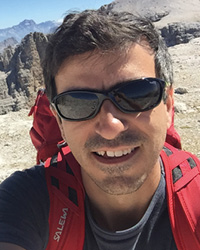Lino Giusti interviews Alessio Zippo
The Centre for Integrative Biology (CIBIO) of the University of Trento explores the frontiers of biology by applying the methodologies of chemistry, physics and mathematics in a variety of areas. We delve deeper, talking with Alessio Zippo about the activity of the research group he coordinates, the Laboratory of Chromatin Biology & Epigenetics.
Professor Zippo, what is epigenetics?
 Epigenetics is a branch of modern biology that studies how the human organism adapts to external stimuli. This process starts at the very beginning of life and shapes the development of the embryo that each of us once was. Epigenetics works on deciphering the mechanisms that allow a cell to “use” only part of the genome, to “interpret” the signals that come from outside and trigger a plasticity and adaptability in the cells themselves. These mechanisms happen at the level of the chromatin, which is the structure within which the genome of each cell is contained and regulated. While the genome must remain unaltered without acquiring mutations that can cause various pathologies such as tumours, the chromatin can change continually, allowing the cell (and thus the organism) to adapt to changes and to the stimuli it receives.
Epigenetics is a branch of modern biology that studies how the human organism adapts to external stimuli. This process starts at the very beginning of life and shapes the development of the embryo that each of us once was. Epigenetics works on deciphering the mechanisms that allow a cell to “use” only part of the genome, to “interpret” the signals that come from outside and trigger a plasticity and adaptability in the cells themselves. These mechanisms happen at the level of the chromatin, which is the structure within which the genome of each cell is contained and regulated. While the genome must remain unaltered without acquiring mutations that can cause various pathologies such as tumours, the chromatin can change continually, allowing the cell (and thus the organism) to adapt to changes and to the stimuli it receives.
What do you think its main applications will be in the future?
Epigenetics is a discipline in continual evolution and it has a range of applications, from new treatments for rare genetic diseases to global illnesses such as cancer. As epigenetics is the basis of the life and evolution of an individual, understanding its mechanisms is fundamental to understanding our bodies and how they respond to various stimuli. Discovering these mechanisms allows us to predict how people respond differently to the same pharmacological treatment. At the moment for the same type of tumour we use a cocktail of drugs but without knowing how that individual will respond to that treatment. Even the most modern anti-tumour treatments from the field of precision medicine suffer from the same problem because we are still not able to interpret epigenetic diversity and therefore how cells will respond.
What does your research group do?
My research group works on understanding the basic epigenetic mechanisms so that we can then study how their deregulation causes diseases such as cancer or rare genetic illnesses such as Kabuki syndrome. In cancer, we are studying how epigenetic alterations might cause the formation of breast tumours and their propagation in distal tissues, causing metastasis. Using a variety of experimental approaches, we have discovered that an epigenetic alteration changes the cells that make up the mammary gland, making them acquire characteristics of tumour stem cells. This happens because these cells “manipulate” their epigenetic state, activating a different genetic heritage and responding in an aberrant manner to the stimuli in the environment. In the area of genetic illnesses, we are focusing on Kabuki syndrome, a rare disorder that affects children from birth and causes a range of alterations to the organism. The first thing we did was to build a test tube model that recapitulates the initial stages of the disease at the cellular level. Using this strategy we were able to observe what happens when this gene is mutated in stem cells, and what we saw shows that the structure of the chromatin in severely compromised. In particular we see changes in the capacity of the cells to respond to mechanical stimuli such as pressure or force which normally guide the formation and organization of the tissues. We also found the mechanism that allows cells to “feel” these alterations in the chromatin and we are doing experimental testing of a drug that has the potential to give the cells back their capacity to respond correctly to mechanical stimuli.
In what ways can industry become involved with your laboratory?
Close contact with the world of innovation and startups can allow our discoveries to be translated into applications for the biomedical field. This is already happening, as we are working with Bayer on the development of a treatment targeted at breast cancer cells. This collaboration began as a development of the research conducted in my lab and has led to the publication of these results in the international journal Nature Communications. Through this work we have found several genes that are reactivated in tumour cells through epigenetic reprogramming. Of these, we are focusing on the genes that encode proteins that could be useful for the development of a precision medicine treatment with the aim of identifying and selectively targeting only the tumour cells that reactivate these genes. With support from the industry we are implementing a translational research study to design and synthesize these precision “missiles” in order to assess their therapeutic efficacy. Similarly, we are looking into using pre-clinical models to test a drug that is able to alleviate some of the alterations observed in the test tube model of Kabuki syndrome. Although the project is in its initial stages, and further studies will be needed to confirm the data we have obtained so far, this project and its application in the field of precision medicine would undoubtedly benefit from the support of the industry.




